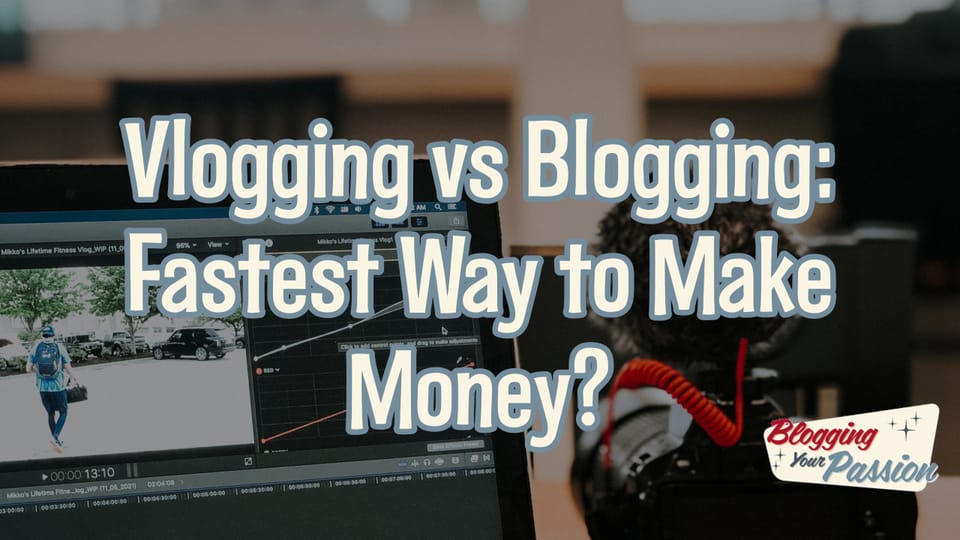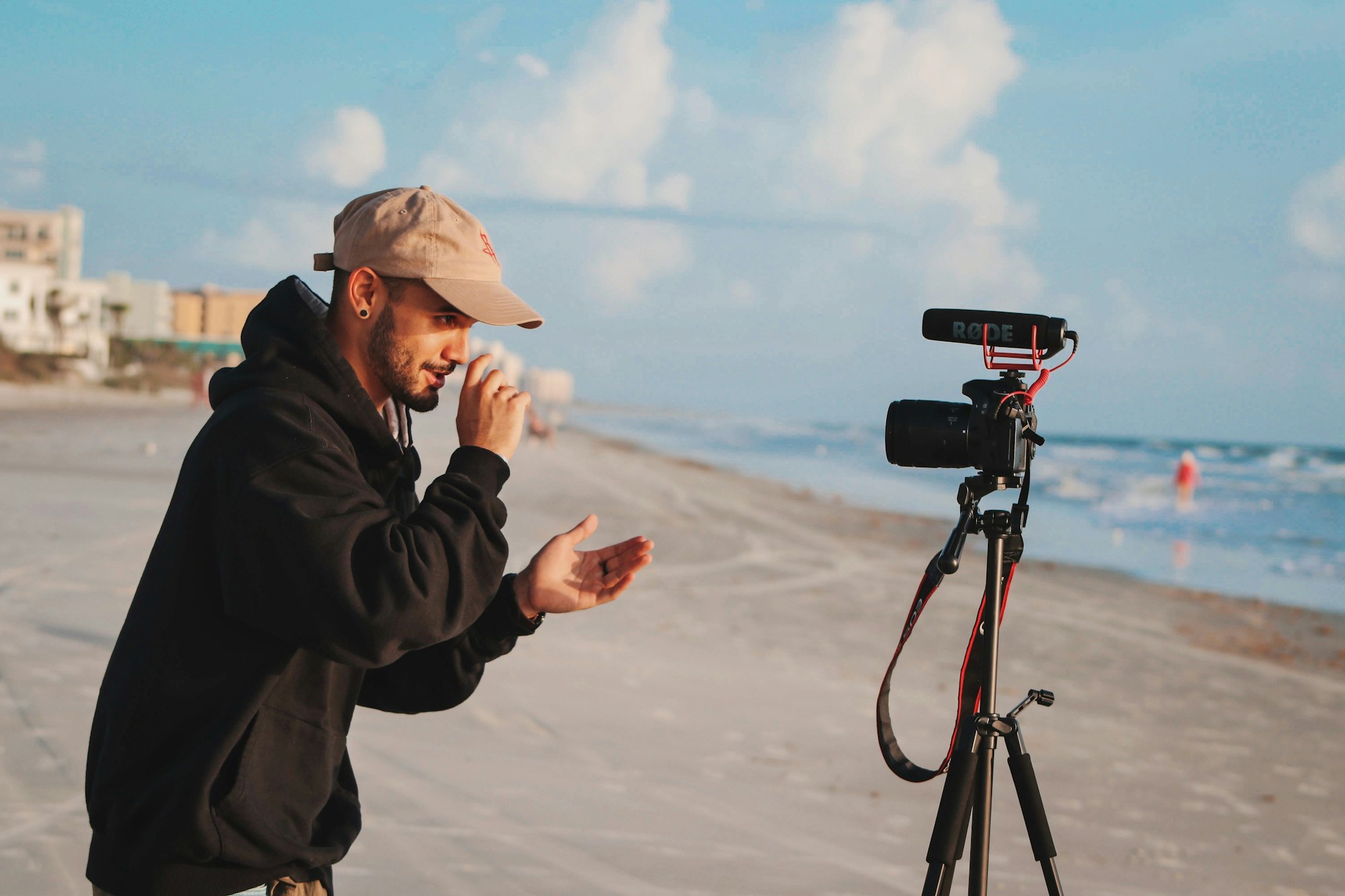Vlogging vs Blogging: Fastest Way to Make Money?

Have you ever wondered about the difference between vlogging and blogging? Well, you're in luck!
In this short introduction, we'll explore the world of vlogging and blogging and help you understand which one might be right for you.
Whether you're looking to share your thoughts and experiences through writing or engage with your audience through videos, both vlogging and blogging offer unique opportunities for self-expression and connection.
So, if you're ready to dive into the exciting world of content creation, let's get started and find out which path resonates with you the most.
Remember, whether you choose to blog or vlog, there's a community out there waiting to welcome you with open arms.
Key Takeaways
- Vlogging relies on videos to showcase personalities and experiences, while blogging focuses on written content and allows for more detailed exploration of topics.
- Vlogging allows viewers to connect with the vlogger on a personal level and is visually appealing and engaging for multimedia enthusiasts, while blogs are easily accessible to a wider range of audiences and foster a sense of community and belonging among readers.
- Vloggers can monetize through advertisements, sponsorships, and merchandise sales, while bloggers can monetize through affiliate marketing, sponsored posts, and selling digital products.
Table of Contents (click to expand)
- Definition and Terminology: Blogging vs Vlogging
- Popularity and Audience Appeal
- Making Money and Monetization Strategies
- Types of Vlogs and Blogs
- Can You Blog and Vlog Together
- Pros and Cons of Blogging
- Pros and Cons of Vlogging
- The Difference Between Blog and Vlog
- How to Start a Blog
- How to Start a Vlog
- Frequently Asked Questions
- Final Thoughts
Definition and Terminology: Blogging vs Vlogging
To understand the difference between vlogging and blogging, let's start by defining the terms and their respective terminology.
Vlogging, short for video blogging, refers to the act of creating and sharing video content online. On the other hand, blogging involves creating written content, typically in the form of articles or posts, and publishing them on a website or blog platform.
Both vlogging and blogging are popular methods for content creators to express themselves and share information with their audience.
When comparing vlogging and blogging, the main distinction lies in the type of content produced. Vlogging primarily relies on videos, allowing creators to showcase their personalities, experiences, and expertise through visual and auditory means. It can be more engaging and personal, as viewers get to see and hear the vlogger directly.
Blogging, on the other hand, focuses on written content. It allows for a more detailed and in-depth exploration of topics. Bloggers can incorporate images and infographics to enhance their posts, but the primary medium is still text.
This format is often preferred for longer articles, tutorials, reviews, and other informative pieces.
Popularity and Audience Appeal
When it comes to popularity and audience appeal, vlogging and blogging offer distinct advantages and resonate with different types of viewers.
Here are three reasons why both vlogging and blogging have a strong appeal to their respective audiences:
Authenticity and Engagement:
- Vlogging allows viewers to connect with the vlogger on a more personal level.
- By sharing their daily lives and experiences through video, vloggers create a sense of authenticity that many viewers find relatable and comforting.
- On the other hand, blogging offers a more in-depth exploration of topics, allowing readers to engage with the content at their own pace and in their own way.
- This level of engagement can foster a strong sense of community and belonging among blog readers.
Visual Appeal and Accessibility:
- Vlogs rely on visuals and audio, making them more visually appealing and engaging for viewers who prefer a multimedia experience.
- Vloggers can showcase their personalities, emotions, and surroundings through video, creating a more immersive experience.
- On the other hand, blogs provide a text-based format that's easily accessible to a wider range of audiences, including those with visual impairments or slow internet connections.
Niche Targeting and Monetization:
- Vlogging allows creators to target specific niches and build a loyal following within that community.
- By focusing on a specific topic or interest, vloggers can attract like-minded viewers who are more likely to engage with their content.
- Vloggers have the opportunity to monetize their channels through advertisements, sponsorships, and merchandise sales.
- Bloggers can also target niche audiences through specialized content, but may have additional opportunities to monetize through affiliate marketing, sponsored posts, and selling digital products.
Making Money and Monetization Strategies

If you want to make money through vlogging or blogging, there are various monetization strategies you can implement.
One way to monetize your video content is by starting a YouTube channel and becoming a YouTube Partner. This allows you to earn money through ads that are displayed on your videos.
Another popular strategy is affiliate marketing, where you promote products or services and earn a commission for every sale made through your affiliate links.
You can also create and sell online courses related to your niche, providing valuable knowledge to your audience while generating passive income.
Email marketing can be a powerful tool for monetization. By building an email list and sending targeted offers and promotions to your subscribers, you can generate income.
It's important to remember that building a successful vlogging or blogging business takes time and effort. Consistency and quality content are key.
Always prioritize your audience's needs and desires, and focus on providing value.
Types of Vlogs and Blogs
If you want to explore the various types of vlogs and blogs, there are endless possibilities for you to choose from. Whether you prefer the video format of vlogging or the written format of blogging, both offer a wide range of content options to suit your interests and creativity.
Here are three types of content you can explore in vlogging and blogging:
- Lifestyle: This type of content focuses on your everyday life and experiences. In vlogs, you can share your daily routines, travel adventures, or even give a glimpse into your home decor and fashion choices. With a lifestyle blog, you can write about your favorite recipes, fitness tips, or personal development journeys.
- Beauty and Fashion: If you have a passion for makeup, skincare, or fashion, this type of content is perfect for you. Vlogs allow you to demonstrate makeup tutorials, review beauty products, and showcase your fashion hauls. Blogs provide a platform to write detailed product reviews, share fashion tips, and create style guides.
- Travel: Whether you're a globetrotter or enjoy exploring your local surroundings, travel content is highly popular in both vlogs and blogs. Vlogs can capture the essence of your travel experiences through stunning visuals and storytelling. Blogs can offer in-depth travel guides, itineraries, and budget-saving tips.
No matter which type of content you choose, both vlogging and blogging offer unique opportunities for content creation and self-expression. It's important to consider your preferences, strengths, and the interests of your audience when deciding which format suits you best.
Can You Blog and Vlog Together?

You can blog and vlog together by incorporating both written and video content into your online platform. Combining these two formats allows you to cater to different audience preferences and engage with a wider range of viewers/readers.
By integrating blog posts and video blogging, you can create a more comprehensive and impactful online presence.
Personal blogs are a great way to share your thoughts, experiences, and expertise with your audience. You can write detailed blog posts about your personal experiences, providing valuable insights and advice.
By adding video content to your blog, you can enhance the storytelling aspect of your personal blogs and create a more immersive experience for your readers.
Video blogging, on the other hand, allows you to connect with your audience on a more personal level. You can use videos to showcase your personality, share behind-the-scenes footage, or provide tutorials and demonstrations.
By incorporating personal experiences into your vlogs, you can create a stronger sense of authenticity and connection with your viewers.
When it comes to vlogging vs blogging, there's no need to choose one over the other. By combining both formats, you can take advantage of the strengths of each and offer your audience a diverse and engaging content format.
Pros and Cons of Blogging
When considering the pros and cons of blogging, it's important to weigh the benefits and drawbacks of this popular online medium. Blogging allows you to express yourself through written content and showcase your writing skills. I
t provides a platform for you to share your knowledge, ideas, and personal experiences with a wide audience.
Here are three pros and cons of blogging:
Pros:
- Search Engine Optimization (SEO): Blogging can greatly improve your website's visibility on search engines. By incorporating relevant keywords and optimizing your blog posts, you can increase your chances of ranking higher in search results.
- Loyal Audience: By consistently providing valuable and engaging content, you can attract a loyal audience who'll keep coming back for more. This can help you build a community and establish yourself as an authority in your niche.
- WordPress Blog: With platforms like WordPress, setting up a blog is relatively easy and doesn't require extensive technical knowledge. You can choose from a variety of themes and plugins to customize your blog and make it visually appealing.
Cons:
- Time and Effort: Blogging requires consistent effort and time investment. From researching topics to writing and editing content, it can be a time-consuming process.
- Competition: The blogosphere is highly competitive, with millions of blogs vying for attention. Standing out and gaining traction can be challenging.
- Monetization: While some bloggers make a significant income through their blogs, it takes time and effort to reach that level. Monetizing a blog may require strategies like affiliate marketing, sponsored content, or selling products/services.
Pros and Cons of Vlogging
To understand the advantages and disadvantages of vlogging, consider the benefits and drawbacks of this popular video medium.
Vlogging offers a unique way to connect with your audience through visual content. Unlike traditional blogging, vlogging allows you to engage your viewers on a more personal level by showcasing your personality and emotions.
One of the main benefits of vlogging is the ability to reach a wider audience. With the rise of social media platforms like YouTube and Instagram, vloggers can easily share their videos and gain exposure to a global audience.
Video editing tools have become more accessible, making it easier for vloggers to create professional-looking videos.
However, vlogging also has its downsides. Unlike blogging, vlogging requires more time and effort in terms of filming, editing, and uploading videos. It can be challenging to consistently produce high-quality content that keeps your audience engaged.
Vlogging may not be suitable for everyone, as some individuals may feel uncomfortable in front of the camera.
Ultimately, the decision between vlogging and blogging depends on your personal preferences and the type of audience engagement you seek.
The Difference Between Blog and Vlog
Moving from the pros and cons of vlogging, let's now delve into the distinction between a blog and a vlog. Understanding the key differences between these two forms of content creation is important if you want to make the right choice for yourself.
Here are three main differences to consider:
- Scope of Content: A blog allows you to cover a wide range of topics, making it ideal for those who want to explore various subjects. On the other hand, a vlog tends to focus on a specific topic or theme, allowing for a more targeted and in-depth exploration of that particular subject.
- Medium of Expression: While a blog is primarily a written platform, a vlog is a video-based platform. This means that blogs rely on written content, images, and sometimes videos, while vlogs are centered around video content. The medium you choose will depend on your preferences and the type of content you want to create.
- Discoverability: Blogs are easily discoverable by search engines, thanks to their text-based nature. This means that blogs have a higher chance of being found by people searching for specific topics. Vlogs, on the other hand, rely more on social media and word-of-mouth for discoverability.
Understanding the main differences between blogging and vlogging will help you determine which platform is better suited for your needs and goals. Whether you choose to write or create videos, both mediums offer unique opportunities for content creation and sharing.
How to Start a Blog

Now that we've explored the differences between blogging and vlogging, let's dive into how you can start your own blog.
Starting a blog is an exciting and creative way to express yourself and connect with others who share similar interests. To begin, you'll need to choose a blogging platform that suits your needs.
There are many options available, such as WordPress, Blogger, and Tumblr. Consider factors like ease of use, design options, and community support when making this decision.
Next, you'll need to choose a domain name for your blog. This is the web address that people will use to access your site. It's important to choose a name that's unique, memorable, and reflects the content of your blog.
You can purchase a domain name through a domain registrar or often through your chosen blogging platform.
After selecting your platform and domain name, it's time to set up your own website. Many blogging platforms offer customizable themes and templates to help you create a visually appealing and functional site.
Personalize your blog by adding your own logo, colors, and layout.
Lastly, consider your personal preferences when it comes to blogging. Are you interested in writing long-form articles or short snippets?
Do you want to focus on a specific niche or cover a wide range of topics? Think about what you enjoy and what you think your audience will appreciate.
Starting a blog is a rewarding endeavor that allows you to share your thoughts and ideas with the world. Remember to have fun, be consistent with your content, and engage with your readers.
How to Start a Vlog

Ready to dive into the world of vlogging? Starting a vlog can be an exciting journey that allows you to connect with others and share your experiences in a more interactive way. Here are three essential steps to help you get started:
- Choose your niche: Just like starting a new blog, it's important to determine what type of content you want to create for your vlog. Whether it's beauty, travel, or cooking, finding your niche will help you attract a specific audience who shares your interests. This will make it easier for you to engage with your viewers and build a community around your vlog.
- Gather your equipment: To create high-quality video content, you'll need some basic equipment. Invest in a good camera or smartphone with a high-resolution camera, a tripod or stabilizer to keep your videos steady, and a microphone for clear audio. Don't forget about good lighting as well, as it can greatly enhance the visual quality of your vlogs.
- Ensure a stable internet connection: Since vlogs are primarily video-based, having a reliable internet connection is crucial. Make sure you have a strong and stable internet connection to upload your videos without any interruptions. This will ensure that your viewers can enjoy your content without buffering or other connectivity issues.
Starting a vlog can be a better choice for those who prefer a more dynamic and interactive way of sharing their stories. So go ahead and take the plunge into the world of vlogging. Your new blog awaits!
Frequently Asked Questions
What Equipment Do I Need to Start a Successful Vlog or Blog?
To start a successful vlog or blog, you'll need the right equipment. It's important to consider your audience's desires for belonging when choosing gear. Begin by discussing the question: "What equipment do I need?"
How Can I Increase the Visibility of My Vlog or Blog to Attract a Larger Audience?
To attract a larger audience to your vlog or blog, focus on increasing visibility. Utilize social media platforms, engage with your audience, collaborate with others, optimize your content for search engines, and make sure to consistently provide valuable and engaging content.
What Are Some Effective Ways to Monetize My Vlog or Blog Besides Advertisements?
To monetize your vlog or blog, there are effective ways besides advertisements. Consider offering exclusive content or products, collaborating with brands or other creators, and engaging with your audience through memberships or sponsorships.
How Long Does It Typically Take to Build a Successful Vlog or Blog?
It typically takes time and effort to build a successful vlog or blog. Consistently creating high-quality content and engaging with your audience is key. Building a loyal following can take months or even years, but it's worth it in the end.
How Do I Come up With Engaging Content Ideas for My Vlog or Blog?
To come up with engaging content ideas for your vlog or blog, start by brainstorming topics that interest you. Consider what your audience might find valuable and entertaining. Research popular trends and ask for feedback from your viewers or readers.
Final Thoughts
Whether you choose to vlog or blog, both platforms offer unique opportunities for sharing your thoughts, experiences, and passions with an audience.
Vlogging allows for a more personal and visual connection, while blogging offers a more traditional and written approach. Both can be monetized and have their own pros and cons.
Ultimately, the decision between vlogging and blogging depends on your preferences, skills, and the kind of content you want to create.
So, go ahead and start your journey in either or both platforms and explore the exciting world of online content creation.
